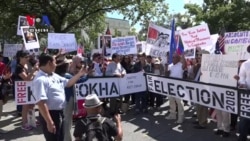Cambodian-Americans from several states gathered at the State Department building in Washington, DC last Friday to protests against political repression in Cambodia.
Last week, the Cambodian authorities arrested the leader of the opposition Cambodia National Rescue Party, Kem Sokha, who was later charged with espionage in a case widely seen as politically motivated.
Several independent media outlets have also been forced to close in recent weeks in what analysts say is a broad crackdown on dissent ahead of next year’s general election.
Protesters unfurled banners and held Cambodian and American flags as they marched on Friday.
Leong Sophorn of Chicago said the demonstrators were demanding that the U.S. government apply more pressure to Phnom Penh to release Sokha and several other CNRP politicians detained over the past two years.
“So we don’t want to see dictators in Cambodia anymore. We want Cambodian citizens to have rightful freedom so that they can vote and choose their leader freely without any pressure like nowadays,” he said.
He added that Cambodia would face economic issues as well as the possibility of sanctions if it continued to move closer to China, its biggest donor, and lender.
“If Hun Sen keeps threatening citizens and arguing with the U.S., I think it will not be good in the future. If the U.S. stops imports particularly farmers and workers in Cambodia will lose their jobs.”
Mam Vireak, a Khmer American living in Ohio, said the government’s actions were “immoral” but hoped it would lead to Cambodians turning out in large numbers to vote against the ruling Cambodian People’s Party next year.
“All institutions are under pressure from the Hun Sen government, which is ruling the country,” he added.
The U.S.-Cambodia relationship has deteriorated since Sokha’s arrest, with Hun Sen calling for the arrest of American citizens he claims were involved in a conspiracy with Sokha to overthrow him.
The government has yet to produce any evidence to substantiate the claims, referring only to a years-old video of a public speech given by Sokha where he referred to receiving advice from Americans and Canadians on setting up a human rights group in the early 2000s.
Venerable Chum Vichet, a monk from a temple in Minnesota, said he wanted to see the current political impasse resolved so that Cambodians could develop the country as a democracy.
“We see that the world, including the U.S., is sending messages. It should be enough for the current government to wake up and admit their wrong actions that are not accepted by their allies around the world,” he said.










